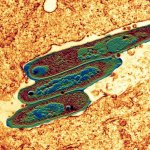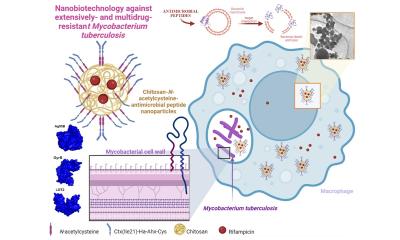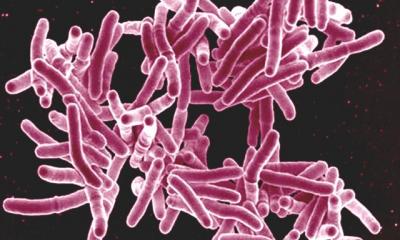
Source: Shutterstock / adriaticfoto
News • Immune system
Tuberculosis vaccine also makes less susceptible to other infections
A tuberculosis vaccine developed 100 years ago also makes vaccinated persons less susceptible to other infections. While this effect has been recognized for a long time, it is not known what causes it. Together with colleagues from Australia and Denmark, researchers from Radboud university medical center the universities of Nijmegen and Bonn have now presented a possible answer to this question. Their results are also interesting against the background of the Covid-19 pandemic: several studies are currently testing the use of the vaccine in preventing severe disease progression in populations at risk such as hospital staff. The study is published in "Cell Host & Microbe".

The BCG vaccine (the abbreviation stands for Bacillus Calmette-Guérin) is the only vaccine that provides effective protection against infections with the tuberculosis bacterium. Since its first medical application in 1921, it has been used billions of times. An unexpected side effect became apparent: vaccinated individuals not only contracted tuberculosis far less frequently, but also other infections. One example comes from Guinea-Bissau in West Africa: there, the mortality of vaccinated newborns was almost 40 percent lower than that of unvaccinated babies
A similar effect has now been observed with other vaccines, almost exclusively with those based on live pathogens. Experts also speak of "trained immunity": the capacity of innate immune response to become more efficient independently of the type of reinfection. However, it is still largely unknown why this training effect can persist for years, even long after the immune cells that were circulating in the blood at the time of vaccination have died. Detailed studies on this topic were lacking, especially in humans; the current study fills this gap to a certain extent: "We vaccinated 15 volunteers with the BCG vaccine and administered a placebo to five more people for comparison," explains Prof. Dr. Mihai Netea from the Radboud university medical center in Nijmegen, the Netherlands. "Three months later, we took both blood and bone marrow samples from these individuals."

Some striking differences were found between the two groups. For instance, the immune cells in the blood of vaccinated individuals released significantly more inflammatory messengers. These so-called cytokines strengthen the effectiveness of the immune defense; for example, they call on other immune cells for help and direct them to the site of infection. Moreover, the immune cells of vaccinated individuals showed activity of completely different genes than in the placebo group, especially those required for cytokine production.
There are many different types of immune cells in the blood. All of them are produced in the bone marrow. This is where the so-called hematopoietic stem cells grow, the "mothers" of all immune cells. The BCG vaccination also causes long-term changes in their genetic program. "We have found that after vaccination, certain genetic material becomes more accessible, which means that it can be read by the cells more frequently," explains Prof. Dr. Andreas Schlitzer from LIMES Institute at the University of Bonn.
Metaphorically speaking, every human cell contains in its nucleus a huge library of tens of thousands of books, the genes. When the cell wants to produce a certain molecule, for example a cytokine, it looks up its assembly instructions in the corresponding book. But not all of the books can be taken out so easily: some are usually under lock and key. The BCG vaccination now makes some of these books available, probably for many months or years. These include those that are needed for increased cytokine production. "This explains why the vaccination results in an enhanced immune response in the long term," said Netea. "This may well be the basis for the lasting impact of the training effect."
Recommended article

News • BCG vs tumour recurrence
Modified tuberculosis vaccine shows promise against bladder cancer
The human immune system can recognize and eliminate not only germs but also cancer cells. This is why treatments with weakened germs can help the immune system in its fight against cancer. Researchers at the Max Planck Institute for Infection Biology in Berlin have genetically modified the tuberculosis vaccine BCG in a way that it stimulates the immune system more specifically. Consequently, the…
Another aspect is also interesting: most of the released books, i.e. the genes that become more accessible after the vaccine has been administered, are additionally controlled by a molecule called HNF. This "hepatic nuclear factor" ensures that the immune cells use their newly acquired power prudently, meaning that they only release cytokines when there is actually a pathogen that needs to be attacked. "It may be possible to use this finding therapeutically to specifically manipulate the trained immunity," explains LIMES researcher Prof. Schlitzer.
The results are also of interest against the background of the current Covid-19 pandemic: the researchers hope that a BCG vaccination might have a positive effect on the disease. Although the trained immune system probably cannot prevent infection with the virus, it may reduce the risk of a severe course. This might benefit especially the particularly vulnerable medical staff. Several large-scale medical studies are currently investigating this question, among others two at Radboud university medical center Nijmegen, and another at the University of Melbourne, which is also a partner in the current project.
However, until the results are available, the WHO does not recommend mass vaccination with the BCG vaccine, also in order not to jeopardize the supply in tuberculosis regions. Tuberculosis claims more than one million victims every year, putting it at the top of the list of the world's deadliest infectious diseases.
Source: University of Bonn
17.06.2020










